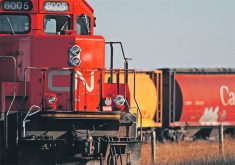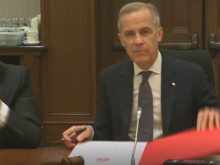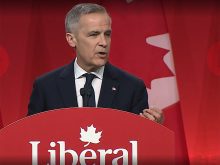From his west coast vantage point, Stan Vander Waal isn’t sure that carbon taxes do what proponents say: change behaviour to reduce greenhouse gas emissions.
The chair of the British Columbia Agriculture Council and owner of Chilliwack-based Rainbow Greenhouses has had nine years to observe the tax in practice.
He said his operation was already using the latest technology to reduce fuel costs when the tax was imposed July 1, 2008.
“On the greenhouse side, the perception was that we would burn less fuel,” Vander Waal said. “That’s one our highest input costs.”
Read Also

Using artificial intelligence in agriculture starts with the right data
Good data is critical as the agriculture sector increasingly adopts new AI technology to drive efficiency, sustainability and trust across all levels of the value chain.
But he had already installed innovations such as curtain and shade systems and double-walled panels to reduce that cost.
“There just isn’t anything that would support that next level of efficiency,” he said.
Links to other stories in this Special Report:
- Alberta’s carbon tax plan may offer insight for others
- Carbon taxation
- Scientists find surprise in soil’s freeze-thaw cycle: nitrous oxide emissions
- Alfalfa, grasses top choices to aid in carbon sequestration
- Carbon tax Down Under went under
- Meeting EU emission standards can be a hurdle
- Can equipment makers do more to make a greener machine?
- Download a PDF of the complete Special Report here
Ottawa has said that carbon plans will be mandatory nationwide in 2018. Provinces are expected to design their own systems or the federal government will impose one. It can be a cap-and-trade system or a carbon tax.
In B.C., the initial tax was $10 per tonne of carbon dioxide equivalent on heating and transport fuel, rising to $30 per tonne, where it has been since 2012.
The idea is that a tax will cause people to gradually reduce fuel use and adjust their habits.
It is also supposed to be revenue-neutral, so all money taken in from the tax is returned through personal and corporate income tax breaks.
A Fraser Institute study earlier this year, however, said the tax ceased to be revenue neutral five years ago as the government moved to more targeted tax cuts, away from broad-based cuts that would spur economic growth.
Farmers have long opposed a carbon tax, arguing that with it, they can’t compete against producers in jurisdictions without a similar tax.
The B.C. greenhouse sector was successful in obtaining a permanent 80 percent rebate on natural gas but others weren’t so lucky.
“A chicken farmer using natural gas is not getting a rebate,” Vander Waal said.
The government also later exempted farmers from paying the carbon tax on coloured gasoline and diesel used on their farms.
Vander Waal said that helps only a little because hauling crops to storage, delivering feed and trucking livestock to market are not exempt.
“All these add on layer after layer after layer of carbon tax,” he said.
The average farmer is paying about $1,000 per year in carbon tax, so no one is likely to go broke over it, he added, but it cuts into the money that farmers have available to reinvest and make their businesses more efficient.
The Pacific Institute for Climate Solutions, which is funded by the B.C. government, released a study in 2014 that found no evidence agricultural exemptions were needed. It noted there was no change in agricultural trade after the tax was imposed.
The study also said that fossil fuels represent on average only four percent of production costs. A carbon tax, therefore, adds only a small cost. It added that farmers may have changed practices to become more energy efficient.
Farmers across Canada could argue that’s exactly the point. In many cases they have taken measures to minimize their carbon footprint through better management practices that use less fuel and sequester carbon.
Yet, they will be paying the carbon tax all along the way without any ability to recover it.
In Alberta, the $20-per-tonne carbon tax implemented Jan. 1, 2017, applies to heating and transportation fuel but exempts farm fuels. The tax rises to $30 in 2018.
The tax is returned to some low-income residents through a rebate, but most of the money goes toward programs for renewable energy and energy efficiency.
Ontario and Quebec both decided to use a cap-and-trade system rather than a carbon tax. This system caps emissions but allows flexibility in how that cap can be met.
Emitters who exceed their caps can buy credits from others with surplus credits.
The Ontario Federation of Agriculture was initially supportive of this type of system but now says it isn’t working. Fuel costs have risen with no way for farmers to offset them; they aren’t exempt under the cap and trade program.
The remaining provinces, except Saskatchewan, are still working on their plans.
Saskatchewan maintains it will not impose a tax that will hurt its agricultural sector.
If that is the case, then Saskatchewan farmers can likely look forward to a system similar to Alberta’s, according to federal Environment Minister Catherine McKenna’s announcement earlier this year.
It will start with a $10-per-tonne tax on fossil fuels and ramp up to $50 per tonne by 2022. The federal government is accepting comments on the proposed plan until June 30 at carbonpricing-tarificationcarbone@canada.ca.
Back in B.C., Vander Waal said he believes all governments would have been better off setting emissions standards rather than taxing inputs.
“The general perception is that most people are just not being more efficient. I think that’s nonsense,” he said. “Any business is always trying to reduce costs.”
He said public perception drove the need for a carbon tax but few city dwellers realize what was already being done in agricultural sectors.
“A carbon tax doesn’t drive efficiency,” Vander Waal said. “Governments should really learn what’s going on on the farm. There’s little knowledge of what’s really being done.”
















